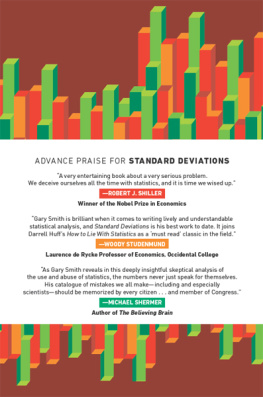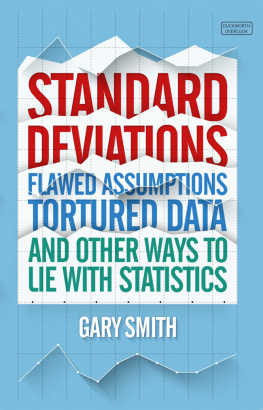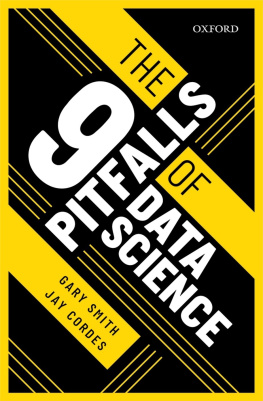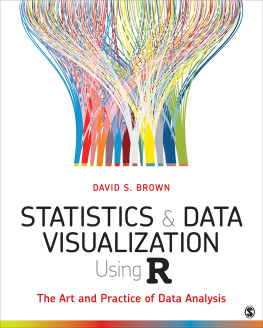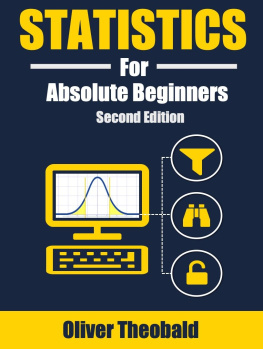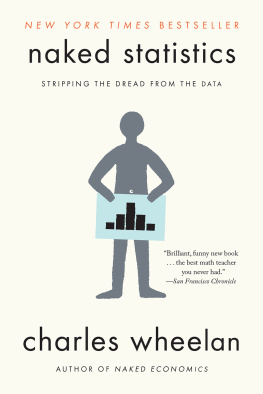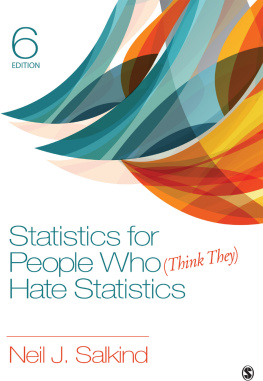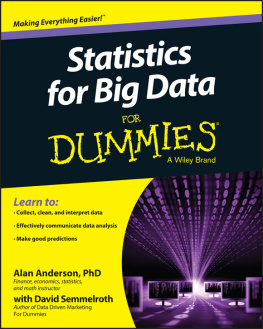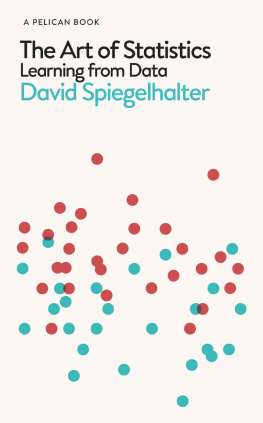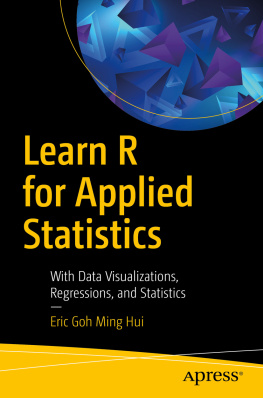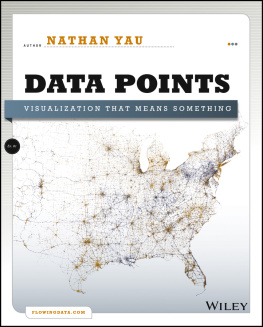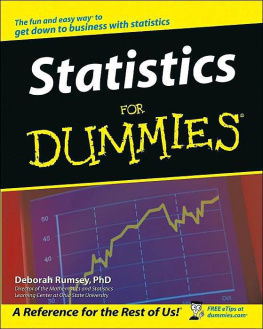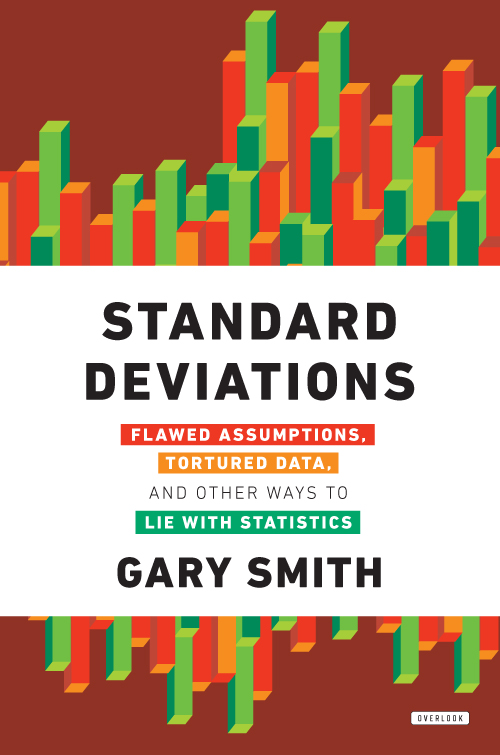This edition first published in hardcover in the United States and the United Kingdom in 2014 by Overlook Duckworth, Peter Mayer Publishers, Inc.
New York
141 Wooster Street
New York, NY 10012
www.overlookpress.com
For bulk and special sales, please contact ,
or write us at the above address.
London
30 Calvin Street
London E1 6NW
www.ducknet.co.uk
Copyright 2014 by Gary Smith
All rights reserved. No part of this publication may be reproduced or transmitted in any form or by any means, electronic or mechanical, including photocopy, recording, or any information storage and retrieval system now known or to be invented, without permission in writing from the publisher, except by a reviewer who wishes to quote brief passages in connection with a review written for inclusion in a magazine, newspaper, or broadcast.
ISBN: 978-1-4683-1068-9
Gary Smiths Standard Deviations is both a statement of principles for doing statistical inference correctly and a practical guide for interpreting the (supposedly) data-based inferences other people have drawn. Cleverly written and engaging to read, the book is full of concrete examples that make clear not just what Smith is saying but why it matters. Readers will discover that lots of what they thought theyd learned is wrong, and theyll understand why.
B ENJAMIN M. F RIEDMAN
William Joseph Maier Professor
of Political Economy, Harvard University
Standard Deviations shows in compelling fashion why humans are so susceptible to the misuse of statistical evidence and why this matters. I know of no other book that explains important concepts such as selection bias in such an entertaining and memorable manner.
R ICHARD J. M URNANE
Thompson Professor of Education and Society,
Harvard Graduate School of Education
We all learn in school that there are three kinds of lies: lies, damn lies, and statistics. Gary Smiths new book imparts true substance to this point by setting forth myriad examples of how and why statistics and data-crunching at large are susceptible to corruption. The great risk today is that the young will forget that deductive logic is vastly more powerful than inductive logic.
H ORACE W OODY B ROCK
President, Strategic Economic Decisions, Inc.
Statistical reasoning is the most used and abused form of rhetoric in the field of finance. Standard Deviations is an approachable and effective means to arm oneself against the onslaught statistical hyperbole in our modern age. Professor Smith has done us all a tremendous service.
B RYAN W HITE
Managing Director, BlackRock, Inc.
Its entertaining, its gossipy, its insightfuland its destined to be a classic. Based on a lifetime of experience unraveling the methodical blunders that remain all too frequent, this book communicates Gary Smiths wisdom about how not to do a data analysis. Smiths engaging rendering of countless painful mistakes will help readers avoid the pitfalls far better than merely mastering theorems.
E DWARD E. L EAMER
Distinguished Professor and Chauncey J. Medberry
Chair in Management, UCLA
Standard Deviations will teach you how not to be deceived by lies masquerading as statistics. Written in an entertaining style with contemporary examples, this book should appeal to everyone, whether interested in marriages or mortgages, the wealth of your family, or the health of the economy. This should be required reading for everyone living in this age of (too much?) information.
A RTHUR B ENJAMIN
Professor of Mathematics, Harvey Mudd College
and author of Secrets of Mental Math
One of those rare books that make people better for having read it.
J AY C ORDES
Senior Manager, RookMedia.net
Most of the authoritative, sciencey-sounding claims were fed by the media are polluted by distortions, biases, and plain old errors. In Standard Deviations, Gary Smith sets the record straight.
D AVID H. F REEDMAN
Author of Wrong: Why Experts Keep Failing Usand
How to Know When Not to Trust Them
DID YOU KNOW that building a quarry in your backyard can increase your property value? Or that Americas unemployment rate is actually zero? Or that drinking a full pot of coffee every morning adds years to your life, but drinking two cups a day increases the risk of cancer?
If you believe the above, then Professor Gary Smith has a World Cuppredicting octopus hed like to show you. The sad truth is that facts like these are routinely presented with a straight face by credentialed academics and backed up with reams of raw data. In Standard Deviations, Smith skillfully unpacks the various ways we are duped by data every day. He deftly demonstrates how a straightforward set of findings can be teased and manipulated to reflect whatever the researcher wants to see.
Lying with statistics is a time-honored con, and in this age of Big Data even the most accredited findings can be suspect. Blending the keen statistical eye of Nate Silver with the probing insights of Daniel Kahneman and Dan Ariely, Smith demystifies the math behind the dismal science, making it easy to spot flaws all around and find the truth hidden in plain sight.
Chapter 1: Patterns, Patterns, Patterns
CBS News, World Cup Final a Battle of Octopus vs. Parakeet, July 14, 2010.
Daily Mail (2010). World Cup 2010: Paul the Psychic Octopus Has Competition as Mani the Parakeet Pecks Holland as his Winners, Mail Online, July 9, 2010.
Daily Mail Foreign Services (2010). Hes No Sucker: Paul the Oracle Octopus is Right For the Seventh Time After Picking Germany to Beat Uruguay to Third Place, Mail Online, July 10, 2010.
Ria Novsti (2010). German Octopus Predicts Spanish Victory in World Cup, July 9, 2010.
Sy Montgomery (2010). Deep Intellect: Inside the Mind of an Octopus, Orion.
Jennifer A. Mather, Roland C. Anderson, and James B. Wood, Octopus: The Oceans Intelligent Invertebrate, Timber Press, 2010.
Bernard Kettlewell, The Evolution of Melanism: The Study of a Recurring Necessity, with Special Reference to Industrial Melanism in the Lepidoptera, Oxford: Oxford University Press, 1973.
M. E. N. Majerus, Melanism: Evolution in Action, Oxford: Oxford University Press, 1998.
A. P. Mller (1992). Female Preference for Symmetrical Male Sexual Ornaments, Nature 357: 23840.
A. P. Mller Sexual Selection and the Barn Swallow. Oxford: Oxford University Press 1994.
A. C. Little, B. C. Jones, C. Waitt, B. P. Tiddeman, D. R. Feinberg, D. I. Perrett, C. A. Apicella, and F. W. Marlowe. Symmetry is Related to Sexual Dimorphism in Faces: Data Across Culture and Species, PLOS one 3(5): e2106. doi:10.1371/journal.pone.0002106.
G. Rhodes (2006). The Evolutionary Psychology of Facial Beauty, Annual Review of Psychology 57: 199226.
John Maynard Smith, David Harper, Animal Signals, Oxford: Oxford University Press, 2003.
Ewen Callaway (2010). Report Finds Massive Fraud at Dutch Universities, Nature 479: 15.
Michael Shermer (2008). Patternicity: Finding Meaningful Patterns in Meaningless Noise, Scientific American 299 (6).
Michael Shermer, The Believing Brain: From Ghosts and Gods to Politics and ConspiraciesHow We Construct Beliefs and Reinforce Them as Truths, New York: Henry Holt, 2011.
Kevin R. Foster and Hanna Kokko (2009). The Evolution of Superstitious and Superstition-Like Behavior, 276 PROC. R. SOC. B. 31, 31.

